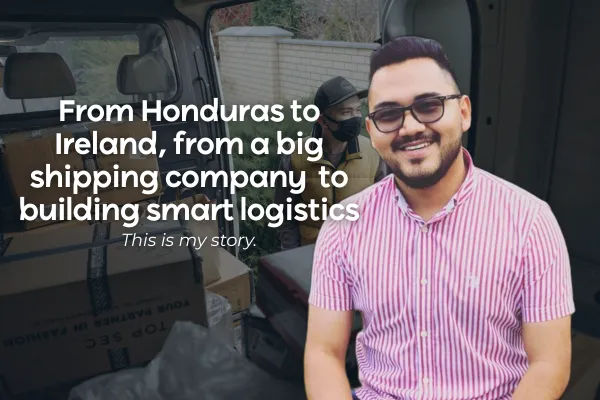
Roberto Valladares
Roberto Valladares
Software Developer at Jett Sender
From Honduras to Ireland, from one of the biggest logistics companies to building smart logistics, this is my story.
Personal Story
I was born in Tegucigalpa, Honduras, in 1994, with roots in the Lenca Indigenous group through my maternal grandfather from Guajiquiro. I come from a conservative, Christian family that has always valued education deeply. My parents worked hard so my sisters and I could pursue professional studies—while they entered the healthcare field, I followed a more technical path.
I first studied industrial electricity in high school at the Luis L. Bogran Technical Institute, guided by my parents’ hope that I would become an engineer. Later, I pursued Systems Engineering at the National Autonomous University of Honduras (UNAH). Knowing that English would be key to my personal and professional growth, I saved up and moved to Ireland for a year and a half to study the language and work.
In Dublin, I worked various jobs—from washing dishes to organizing packages at one of the biggest logistics companies. These experiences didn’t just help me master English; they shaped my worldview. I learned to adapt, respect new cultures, and understand how different systems can operate more efficiently. It’s this global mindset I now apply at Jett Sender.
Joining the Jett Sender team this year as a Software Developer felt like the right step. I was drawn by the mission, the innovation, and the opportunity to build something impactful from the ground up. Having Luis Colindres as CEO has been incredibly motivating — a true mentor who pushes us beyond our limits.
Here, I contribute through software automation, AI integration, and system development — always focused on elevating our tech to better serve our users. The collaborative spirit, open communication, and culture of constant learning make working at Jett Sender an honor.
Professional Background
Throughout my career, I’ve worked as a full-stack developer in both the public and private sectors, as well as in startup environments. My focus has always been on building efficient, user-centered, scalable digital solutions.
In the public sector in Honduras, I worked at SENPRENDE and the Honduran Social Investment Fund (FHIS). I led software development teams, coordinated national-level projects, and developed databases, registration systems, technical assistance platforms, and real-time reporting tools using technologies like Laravel, Angular, Node.js, SQL Server, and MySQL.
In the private sector, I worked with K2A Soft (Spain) and Circuitos y Desarrollos en Tecnología (Honduras). At K2A, I built custom platforms for clients like Anecoop and Emove Festival, using Laravel, Angular, and Ionic to create everything from admin dashboards to hybrid mobile apps. At Circuitos, I developed weather station monitoring systems integrated with physical sensors via Arduino.
As a freelance developer for unBlock (Spain), I worked on a smart city mobile app—fixing bugs and improving core features to enhance the experience for both locals and tourists. I’ve also served as a robotics lab instructor at Tecnikids Costa Rica, teaching programming and applied science to high school students.
My technical foundation is backed by strong leadership, problem-solving, and adaptability across diverse environments. I’m committed to building solutions that have real, lasting impact.
My Experience at on of the biggest logistics companies
While studying English in Ireland, I worked night shifts at the company during peak seasons. At the massive Dublin distribution hub—one of the busiest in the country—I learned a lot about how traditional logistics systems work... and fail.
My job, along with two teammates, was to sort and stack all packages headed to Sligo, loading pallets up to 2 meters high under strict time pressure. It was intense physical labor, nonstop from 6:00 p.m. to 2:30 a.m. There was no time for "fragile" labels—everything moved by force and speed.
What shocked me most was how small packages were treated. Lightweight boxes and padded envelopes would fall off conveyors and lie on the floor for hours—sometimes an entire shift—ignored and stepped over. Only near the end of the night, when the chaos slowed, would someone finally pick them up.
Larger packages were prioritized, stacked as the base, moved first. Smaller ones were often tossed or crushed under pressure. In that system, efficiency ruled over care. The small, the fragile, the precise—they got lost. Literally and figuratively.
That experience stuck with me. It showed me how traditional shipping models — built for volume, not precision — leave the little things behind. It’s part of why I believe so deeply in Jett Sender’s mission today: to create a smarter, more human way to ship.